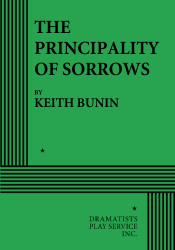THE STORY: In 1923, a young New York socialite named Iris abandons America for the lavish garden of a Belgian castle, where she is courted first by Teddy, an idealistic young banker, and then by Marc, an embittered veteran of the Great War. In 1934, after Iris’ death, Teddy and Marc find themselves back in Belgium, fighting over the garden they have inherited from her, and fighting over a woman who looks almost exactly like her. In 1947, the sons of Teddy and Marc meet each other in the garden, along with a free-spirited oil man’s daughter named Holly, in one last attempt to settle old scores and set the spirits of the castle at rest, once and for all.
“If Mr. Bunin is clearly studying in the school of Pirandello, then he is an apt pupil. The characters seem like perfectly sane people who can slip into weirdness between one word and the next. Keeps the audience wondering about the author’s intentions right to the end.” —The New York Times.
“A classic Boulevard mixture, in three acts, of comedie de moeurs and metaphysical romance, in the moonstruck vein that swept the theater in the heyday of James M. Barrie and A.A. Milne. It’s a measure of Bunin’s intelligence—and of an authority startling in a writer so young—that not only does every line of his script ring true, but the whole thing hangs together as smoothly as if it had been written half a century earlier. 'The Principality of Sorrows’ is Belgium, forever a pawn in international power games, but it’s also the past, which hangs over us if we submit to it, and trips us up whenever we try to shake ourselves free. A lot of thoughts, ironies, anger, and epigrams are kicked up amid the mud and flowers…restoring some juice to the theater after years of dry despair.” —Village Voice.
